写作教程第二版(邹申)-Unit 8 Education
- 格式:ppt
- 大小:368.50 KB
- 文档页数:20

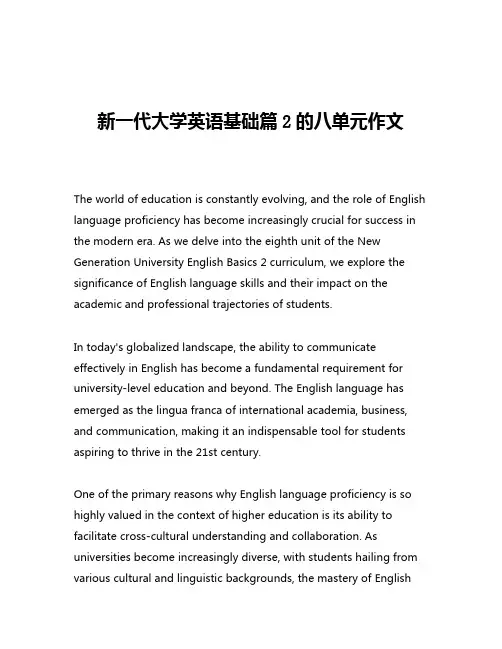
新一代大学英语基础篇2的八单元作文The world of education is constantly evolving, and the role of English language proficiency has become increasingly crucial for success in the modern era. As we delve into the eighth unit of the New Generation University English Basics 2 curriculum, we explore the significance of English language skills and their impact on the academic and professional trajectories of students.In today's globalized landscape, the ability to communicate effectively in English has become a fundamental requirement for university-level education and beyond. The English language has emerged as the lingua franca of international academia, business, and communication, making it an indispensable tool for students aspiring to thrive in the 21st century.One of the primary reasons why English language proficiency is so highly valued in the context of higher education is its ability to facilitate cross-cultural understanding and collaboration. As universities become increasingly diverse, with students hailing from various cultural and linguistic backgrounds, the mastery of Englishallows for seamless exchange of ideas, research, and knowledge. This, in turn, fosters an environment of intellectual discourse and innovation, where students can engage with their peers, professors, and the global academic community on an equal footing.Moreover, the proficiency in English language skills extends far beyond the confines of the classroom. In the pursuit of academic excellence, students are often required to access a wealth of scholarly resources, from journal articles and research papers to online databases and educational platforms. The ability to comprehend and navigate these materials in English becomes a crucial determinant of a student's success, as it grants them access to a vast repository of knowledge that might otherwise be inaccessible.The significance of English language skills is further amplified when considering the professional aspirations of university students. In an increasingly interconnected world, employers across a diverse range of industries seek candidates who possess strong communication abilities in English. Whether it is participating in international meetings, drafting reports and proposals, or engaging with clients and stakeholders from around the globe, the command of the English language becomes a valuable asset that can open doors to numerous career opportunities.Furthermore, the mastery of English language skills can significantlyenhance a student's personal growth and development. The ability to express oneself clearly and confidently, to articulate complex ideas, and to engage in meaningful dialogues can foster a sense of self-assurance and cultural awareness. This, in turn, can lead to improved academic performance, increased employability, and a deeper understanding of the world beyond one's immediate surroundings.In the context of the New Generation University English Basics 2 curriculum, the eighth unit focuses on honing these essential English language skills. Through a comprehensive and structured approach, students are exposed to a variety of learning experiences designed to enhance their proficiency in areas such as academic writing, public speaking, and intercultural communication.The unit's emphasis on academic writing equips students with the necessary tools to craft well-structured, coherent, and persuasive essays, research papers, and other forms of academic discourse. This skill set not only benefits students in their university coursework but also prepares them for the rigors of postgraduate studies and professional writing tasks.Alongside the development of academic writing skills, the unit also places a strong emphasis on public speaking and presentation skills. In today's world, the ability to effectively communicate ideas, convey complex information, and engage audiences is a highly sought-afterskill. By mastering these techniques, students can enhance their confidence, improve their critical thinking abilities, and become more adept at navigating various professional and academic settings.Furthermore, the unit's focus on intercultural communication underscores the importance of cultural awareness and sensitivity in the global context. As students navigate the diverse landscape of higher education and the professional world, the ability to understand and adapt to different cultural norms, communication styles, and perspectives becomes paramount. By fostering these skills, the curriculum empowers students to engage in meaningful cross-cultural exchanges, foster inclusive environments, and contribute to the advancement of international collaboration and understanding.In conclusion, the eighth unit of the New Generation University English Basics 2 curriculum represents a crucial step in equipping students with the essential English language skills necessary for success in the modern world. By emphasizing academic writing, public speaking, and intercultural communication, the unit empowers students to become confident and effective communicators, poised to excel in their academic pursuits and navigate the global professional landscape with ease. As the world continues to evolve, the mastery of English language proficiency will undoubtedly remain a cornerstone of personal and professional growth, and the lessonslearned in this unit will serve as a solid foundation for the future endeavors of these aspiring scholars and leaders.。
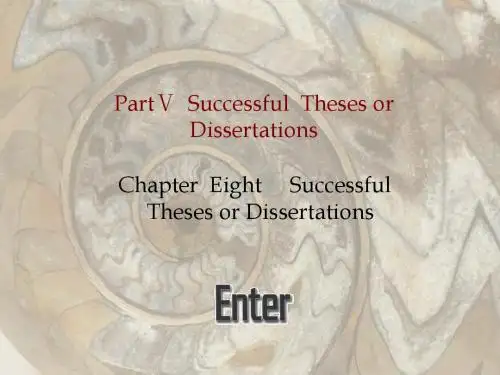
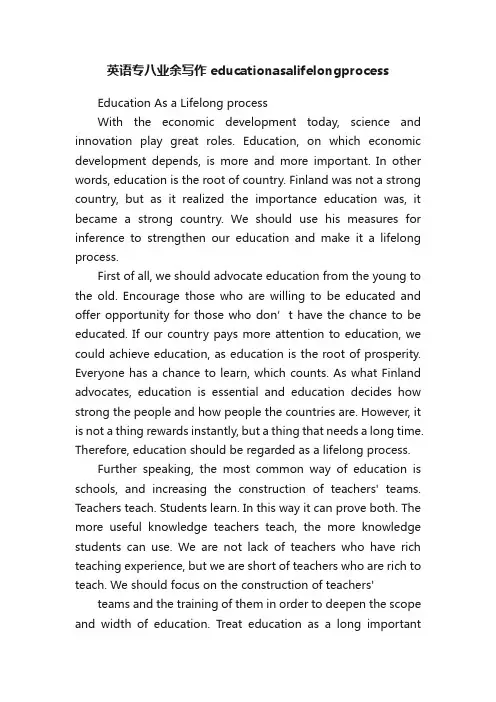
英语专八业余写作educationasalifelongprocessEducation As a Lifelong processWith the economic development today, science and innovation play great roles. Education, on which economic development depends, is more and more important. In other words, education is the root of country. Finland was not a strong country, but as it realized the importance education was, it became a strong country. We should use his measures for inference to strengthen our education and make it a lifelong process.First of all, we should advocate education from the young to the old. Encourage those who are willing to be educated and offer opportunity for those who don’t have the chance to be educated. If our country pays more attention to education, we could achieve education, as education is the root of prosperity. Everyone has a chance to learn, which counts. As what Finland advocates, education is essential and education decides how strong the people and how people the countries are. However, it is not a thing rewards instantly, but a thing that needs a long time. Therefore, education should be regarded as a lifelong process.Further speaking, the most common way of education is schools, and increasing the construction of teachers' teams. Teachers teach. Students learn. In this way it can prove both. The more useful knowledge teachers teach, the more knowledge students can use. We are not lack of teachers who have rich teaching experience, but we are short of teachers who are rich to teach. We should focus on the construction of teachers' teams and the training of them in order to deepen the scope and width of education. Treat education as a long importantbusiness.In addition, the establishment of libraries is also a way to improve the lifelong process of education. Books are the motive and also the energy to education. Moreover, libraries, as the specific knowledge, are as important as schools. They should pen to people free. In this way, we would gain more resources and use them to educate or learn. Building more libraries is important and opening them free to people is more important. It is the way to make knowledge alive and make education alive. This, therefore, contributes to lifelong process of education.Above all, we should keep in mind that education is the root. And the ways of strengthening education are the attention to establishing teachers’teams and schools. Moreover, encouragement and policies on libraries are necessary. Make education a priority and make education alive are the lifelong process of education.。

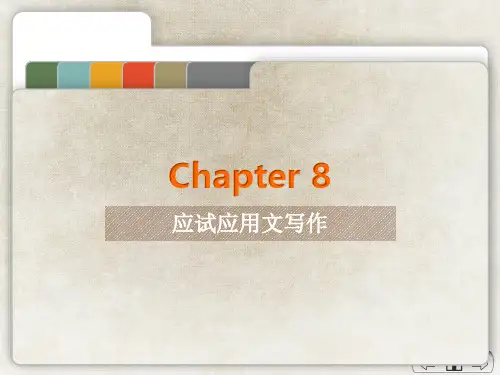



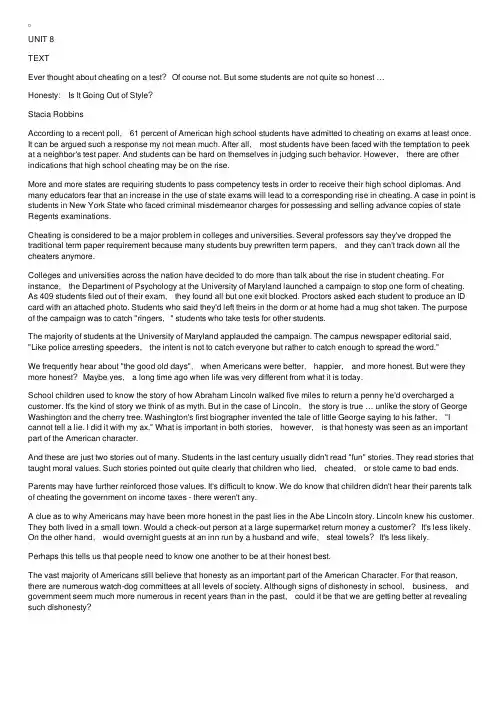
UNIT 8TEXTEver thought about cheating on a test? Of course not. But some students are not quite so honest …Honesty: Is It Going Out of Style?Stacia RobbinsAccording to a recent poll, 61 percent of American high school students have admitted to cheating on exams at least once. It can be argued such a response my not mean much. After all, most students have been faced with the temptation to peek at a neighbor's test paper. And students can be hard on themselves in judging such behavior. However, there are other indications that high school cheating may be on the rise.More and more states are requiring students to pass competency tests in order to receive their high school diplomas. And many educators fear that an increase in the use of state exams will lead to a corresponding rise in cheating. A case in point is students in New York State who faced criminal misdemeanor charges for possessing and selling advance copies of state Regents examinations.Cheating is considered to be a major problem in colleges and universities. Several professors say they've dropped the traditional term paper requirement because many students buy prewritten term papers, and they can't track down all the cheaters anymore.Colleges and universities across the nation have decided to do more than talk about the rise in student cheating. For instance, the Department of Psychology at the University of Maryland launched a campaign to stop one form of cheating. As 409 students filed out of their exam, they found all but one exit blocked. Proctors asked each student to produce an ID card with an attached photo. Students who said they'd left theirs in the dorm or at home had a mug shot taken. The purpose of the campaign was to catch "ringers," students who take tests for other students.The majority of students at the University of Maryland applauded the campaign. The campus newspaper editorial said,"Like police arresting speeders, the intent is not to catch everyone but rather to catch enough to spread the word."We frequently hear about "the good old days", when Americans were better, happier, and more honest. But were they more honest? Maybe yes, a long time ago when life was very different from what it is today.School children used to know the story of how Abraham Lincoln walked five miles to return a penny he'd overcharged a customer. It's the kind of story we think of as myth. But in the case of Lincoln, the story is true … unlike the story of George Washington and the cherry tree. Washington's first biographer invented the tale of little George saying to his father, "I cannot tell a lie. I did it with my ax." What is important in both stories, however, is that honesty was seen as an important part of the American character.And these are just two stories out of many. Students in the last century usually didn't read "fun" stories. They read stories that taught moral values. Such stories pointed out quite clearly that children who lied, cheated, or stole came to bad ends.Parents may have further reinforced those values. It's difficult to know. We do know that children didn't hear their parents talk of cheating the government on income taxes - there weren't any.A clue as to why Americans may have been more honest in the past lies in the Abe Lincoln story. Lincoln knew his customer. They both lived in a small town. Would a check-out person at a large supermarket return money a customer? It's less likely. On the other hand, would overnight guests at an inn run by a husband and wife, steal towels? It's less likely.Perhaps this tells us that people need to know one another to be at their honest best.The vast majority of Americans still believe that honesty as an important part of the American Character. For that reason,there are numerous watch-dog committees at all levels of society. Although signs of dishonesty in school, business, and government seem much more numerous in recent years than in the past, could it be that we are getting better at revealing such dishonesty?。

专八写作讲义八级写作复习要点:▪写长法(平时自己争取写到500字;将我们讲到的近年真题都要模写一遍,并与我们后面的分析和范文比较得失)▪本核心教程▪扩展阅读任何一本托福雅思写作参考书(考前1个月突击背诵该书中所有例子即可)词汇和句型:▪1)务必将本讲稿中所有范老师本人范文(见附录)以及学生样文、其他参考文章视作一个核心资源库,学习掌握所有动词句型结构。
▪2)熟练掌握开头、结尾的基本方法和各种类型段落的写作要点。
▪3)熟练掌握讲稿最后的谚语警句的附录。
我的4篇长篇范文见附录:囊括了重要前沿句型和长句的风格示范,应熟练背诵后学会写长句的感觉。
然后在此基础上写2+1模式。
整体八级突击战术:▪请大家在复习阅读、翻译过程中注意背诵和吸收好的词汇、例子和句型,这样和写作结合起来的整体战术对你全面突破八级最为有意义。
▪“书上有路勤为径”—奋斗100天常见写作主要问题和错误类型▪单词拼写错误;同义词替换不够,单词过于重复;句型变化不够;连词使用过少导致段内逻辑关系不够清晰;主体论述部分的分论点过于交叉或接近;不知道如何写中间论述段落,不知道如何展开。
▪审题不认真(后面我们将通过分析真题解析如何审读题目)当您写作文时,应注意以下几个方面:▪1.使用了正确的语法结构,比方说,动词时态一致、主谓一致、用词准确(尤其是名词、动词、形容词)、冠词错误和介词错误。
2.句式有变化: 定语从句,状语从句,强调句,被动句等优先考虑。
尤其“四大句型”。
3.使用了一定的词汇量。
4.拼写没有错误。
5.在每段的主题句中都表明了这个段落的中心思想,所有扩展句都紧扣主题。
6.使用了过渡性词语,因而句子之间和段落之间都有逻辑性和条理性。
7.每一段话都得到充分的展开。
8.提供了足够的细节、例子或推理性论据。
9.明确的观点。
10 . 注意书法;尽可能不要分字;写大概10至12个字一行,这样可限制自己字体不会太大,字与字之间的空位也不会太大,而且数字时也比较方便;尽量选择粗线条的原子笔和蓝色墨水。
UNIT 8 Text A Unwritten Rules.Teaching Objectives1. Understand the audio materials of this unit.2. Grasp the key words , phrases and structure.3. Master the skills of writing and reading in this unit.1) Developing passages beginning with rhetorical questions2) Distinguishing between facts and opinions in reading materials.II. Teaching Content1. Lead-in Activities2. Text Organization3. Skill Learning in Writing and Reading4 .Language Points (key words, phrases and difficult sentences)5. Gra mmar Focus ( “must have done ”pattern )6 .Guided Practice ( exercises, oral practice and group work )III. Teaching Process1. Warm-up Questions/Activity1) General Introduction: How do you behave when you’re alone? Late at night when no oneelse is around, do you burst into spontaneous song and dance? roll around on the grass? make faces at the Moon? If you’re like most of us, you probably don’t do any of these things (very often!)---in fact you probably don’t even talk to yourself (much!). The unwritten rules and regulations of decent behavior--- which some people call “ the social contract”--- are an amazingly strong force in our lives.2) Pair Ss and ask them to recall one experience of breaking a certain rule, either consciously orunconsciously.3) Have them prepare for the following questions:-----Did you realize you broke a rule at the moment it happened?-----If so why did you do that?-----How did you feel about that?-----Were you punished? Why or why not?2. Text OrganizationThe text can be divided into three parts:Part one (para1-5) The author takes an event in restaurant as an example to reveal a common phenomenon-people are governed by some unwritten rules and customs, which makes a civilization.Part two (para6-9) The author provides more examples to illustrate his ideas.Part three (para10) A conclusion: There are many rules that we all obey and we won’t think about them until rare person violates them. But they are necessary parts in a civilization.3. Skill Learning in Writing and Reading1) Writing Skill: Learn to write paragraphs based on rhetorical questions. Rhetorical questions arequestions that the writer asks in order to make a point, not because s/he doesn’t know the answer. On the one hand, the writer already knows or thinks s/he knows how most people will answer these questions. On the other hand, the writer answers his own rhetorical questions.Example:Have you ever had a brilliant idea that you never told anyone about ? Too many of us neglect our own moments o f genius because we don’t have enough confidence. When you hear the word “genius”, do you automatically think it refers to someone else ? Probably—and that’s the biggest barrier to being a genius yourself.2) Reading Skill: Distinguishing between facts and opinions in reading materials.The ability to tell the difference between facts on the one hand and the writer’s opinions or interpretations on the other is a crucial comprehension skill. Facts are statements that tell what really happened or what the case is, and they are usually based on direct evidence. Opinions, on the other hand, are statements, of belief, judgement or feeling. Opinions, of course, are often based on facts-but they also involve the writer’s personal interpretation of the facts, which may or may not match your interpretation of them. The biggest difficuty in distinguishing fact from opinion, however, may arise when you agree with the writer’s opinion: When w e believe something very strongly, it’s easy to mistake our opinions for facts! So critical reading involves careful examination of our own beliefs as well as the author’s.4. Language Points1)rule: Statement of what can, should or must be done in certain circumstances or when playing agame.2) unwritten rule: Rule that is based on custom and practice rather than by law, but is not writtendown.3) A steady hum of conversation hung over the room. (para1)hang over:remain, esp. as sth. Unpleasant or threateningExamples:A Smog used to hang over the city.An economic crisis is hanging over the country.They felt some kind of disaster was hanging over them.With the court case hanging over us, we couldn't enjoy our vacation.4) The man was shouting at the top of his voice. (para3)at the top of one's voice /lungs : as loudly as one canExamples:The fans screamed at the top of their voice at the sight of Michael Jackson.5) ...just as suddenly as he had started, he lowered his voice and finished whatever it was he had to say in a tone the rest of us could not hear…(para3)paraphrase—…just as he had suddenly started shouting, he suddenly lowered his voice and finished his words no matter what it was that he wanted to say , so quietly that the others could not hear.lower/raise one's voice : speak more quietly/loudlyExamples:She lowered her voice and told her friend a secret.The professor raised his voice so that everyone in the classroom could hear him.6) ... with the pressures of our modern world you would almost expect to run into such things on a regular basis. But you don't; as a matter of fact. (para4)paraphrase—In modem society where people are suffering stresses of life and work you almost take it for granted that you would meet with such things very often. But you don't encounter such things very often; in fact ...on a ... basis : (be done) in a ... way; using a... methodExamples:These people donate their blood on a voluntary basis (= voluntarily).The results of the experiment are checked on a daily basis (= every day).as a matter of fact: in fact; in realityExamples:I'm going there tomorrow, as a matter of fact.Nobody wants to miss the opening ceremony; as a matter of fact, they've already bought the tickets for it.7) …when I th ought it over I realized that it was the first time in my life I had witnessed such a demonstration. (para4)witness such a demonstration: see such a burst of emotionwitness vt. see (sth.) happen; observeExamples:The police are trying to find people who witnessed the car accident.He arrived home just in time to witness his brother being taken away by the police. demonstration : n. a display or expression of emotion7)…it’s just one example of the unwritten rules we live by .(para5)the unwritten rules we live by : the unwritten rules which we follow.live by: live according to; behave according to a particular set of rules or ideasExamples:He lives by a strict moral code.Honest labor is the principle we live by.9) The customs that govern us are what make a civilization. (para5)paraphrase—The generally accepted practices that we follow are the elements which make up a civilized society.make: vt. (of sth.) be responsible for the success of (sth. else)Examples:It's his acting that really makes the film.The novel made the young writer.10) …—even in our disintegrating society—we obey them.(para5)a disintegrating society: a society that is falling apartdisintegrate: vi. break into small piecesExamples:The box was so old it just disintegrated when I picked it up.The spacecraft disintegrated as it entered the Earth atmosphere.11) Is it for safety’s sake? (para6)for sth.'s /sb.'s sake (for the sake of sth. /sb.) : for the purpose of sth./sb.; for the benefit of sth./sb.Examples:You know you are not studying for your patents' sake.For the sake of your safety, please fasten your seatbelt.12) At major athletic events, it is not uncommon to find ... (para7)paraphrase—At important sports competitions, it is fairly common to find ...Note that the negative sense of "uncommon" is reversed by the use of another negative word "not". Such "double negative" phrases are devices of understatement.13) There aren’t enough security guards on hand to keep all the spectators from getting out of theirand walking onto the field. (para7)on hand: available; near and ready to helpExamples:He had no cash on hand to pay for the rent.Oliver was frequently on hand for discussion.14) It’s just another unwritten rule of human conduct that people automatically make good on th eirdebts.(para8)automatically make good on their debts : repay what they owe without being askedmake good : repay; make up forExamples:The policeman told the boy's parents that the boy must make good the money he had stolen or go to jail.She promised that she would make good the loss.15) They would no sooner walk out on a bill than start screaming.(para8)walk out on : leave one's responsibility for; fail to fulfillExamples:You can't walk out on the contract, or you could be taken to court.His wife walked out on him, and was later seen with another man.5. Grammar Focus:The must have done patternProcedures:1) Ask Ss to recall the use of must be to give a guess or draw a logical conclusion concerning apresent event, for example:The man who is speaking to all the teachers must be our new school master.Judging from his looks, he must be over fifty now.The children must be very tired after their long journey.2) Explain to them that the“must have done”pattern is used to give a guess or draw a logical conclusion concerning a past event before using the following examples to illustrate:The ground is wet. It must have rained last night.Brown is not in his dorm. He must have gone to the library.They set out early this morning. They must have arrived by now.3) have Ss do Structure Exercise VIII. for practice.6. Guided Practice ( exercises, oral practice and group work)1) SummaryA) Ask several students to retell the text by using their own words.B) Talk about the main idea or theme of the text.2) ExerciseEX. II , p225 -226 (Comprehension of the Text)EX. III, IV,,V, p226-227 (Vocabulary Revision)EX.VI, VII, p227-229 ( Word Building: suffix –ity , -al, -ful, -less, -ment)EX.VIII, p229-230 (“must have done”pattern)7. After-class Assignments1)EX.IX, X, P230 ( Translation)2) EX.XI, p231 ( Cloze)3) Writing ( Write a paragraph based on rhetorical questions. p233 )4) preview text BText B A Traffic Light Is a Brainless Machine Language Points:1. “little people”of French (para1)paraphrase—common French people at the bottom of society.2…. the most stimulating , if frequently frustrating, conversationaists….(para1) paraphrase—people who like to talk to others in a way that, though it often upsets and discourages other people, arouses their interest and excitementif=even if ( used when admitting that something may be true or may happen)3. Of them all, the most wildly creative are the taxi drivers (para1)paraphrase—Among all these people, taxi drivers are trhe most fanciful and imaginative.4.I deliberately provoke arguments with them(para1)paraphrase—I try to annoy them on purpose and involve them in arguments.5…a species of man similar in spirit, if not in exact form, to the French (pa ra1)paraphrase—a type of people who are similar to the French in spirit though they may not look very much like the French in appearance.6…we were rolling along…(para2)paraphrase—We were driving along…7. The same performance was repeated at the Alma Bridge. (para2)paraphrase—The driver did the same thing again (sailing through the red light in a burst of speed) at the Alma Bridge.8. He cut me off as I started to protest. (para4)paraphrase—He intrrupted me when I bagan to argue with him.9. It’s a stop signal and means that traffic is rolling in the other direction. (para5)traffic is rolling: vehicles are moving10. …there is cross traffic.(para6)paraphrase—…there are vehicles moving in the other direction11. What would you have me do? (para6)paraphrase—What would you expect me to do?12….he thundered…(para6)paraphrase—he shouted loudly and angrily13….,and it would be a sin against nature to surrender them to the dictates of a machine.(para6)paraphrase—…, and it would be morally w rong to give over my eyes, brain and judgment to the control of a machine.14. …if I let those blinking lamps do my thinking for me. (para6)paraphrase—…if I let the changing trafic lights replace my brain and judgement15. The intellectual originality of the French is a corrupting influence if you are subjected to itfor long. (para7)paraphrase—The ability of the French people to think for themselves and form their own ideas can corrupt your mind if you are constantly affected by it.be subjected to :cause to experience; sufferExample:Everyone interviewed had been subjected to unfair treatment.16. I find my old Anglo-Saxon standards somewhat shaken. (para7)standards: n .a moral principle that affects people’s attitudes and bahavior。
Education As a Lifelong processWith the economic development today, science and innovation play great roles. Education, on which economic development depends, is more and more important. In other words, education is the root of country. Finland was not a strong country, but as it realized the importance education was, it became a strong country. We should use his measures for inference to strengthen our education and make it a lifelong process.First of all, we should advocate education from the young to the old. Encourage those who are willing to be educated and offer opportunity for those who don’t have the chance to be educated. If our country pays more attention to education, we could achieve education, as education is the root of prosperity. Everyone has a chance to learn, which counts. As what Finland advocates, education is essential and education decides how strong the people and how people the countries are. However, it is not a thing rewards instantly, but a thing that needs a long time. Therefore, education should be regarded as a lifelong process.Further speaking, the most common way of education is schools, and increasing the construction of teachers' teams. Teachers teach. Students learn. In this way it can prove both. The more useful knowledge teachers teach, the more knowledge students can use. We are not lack of teachers who have rich teaching experience, but we are short of teachers who are rich to teach. We should focus on the construction of teachers'teams and the training of them in order to deepen the scope and width of education. Treat education as a long important business.In addition, the establishment of libraries is also a way to improve the lifelong process of education. Books are the motive and also the energy to education. Moreover, libraries, as the specific knowledge, are as important as schools. They should pen to people free. In this way, we would gain more resources and use them to educate or learn. Building more libraries is important and opening them free to people is more important. It is the way to make knowledge alive and make education alive. This, therefore, contributes to lifelong process of education.Above all, we should keep in mind that education is the root. And the ways of strengthening education are the attention to establishing teachers’teams and schools. Moreover, encouragement and policies on libraries are necessary. Make education a priority and make education alive are the lifelong process of education.。